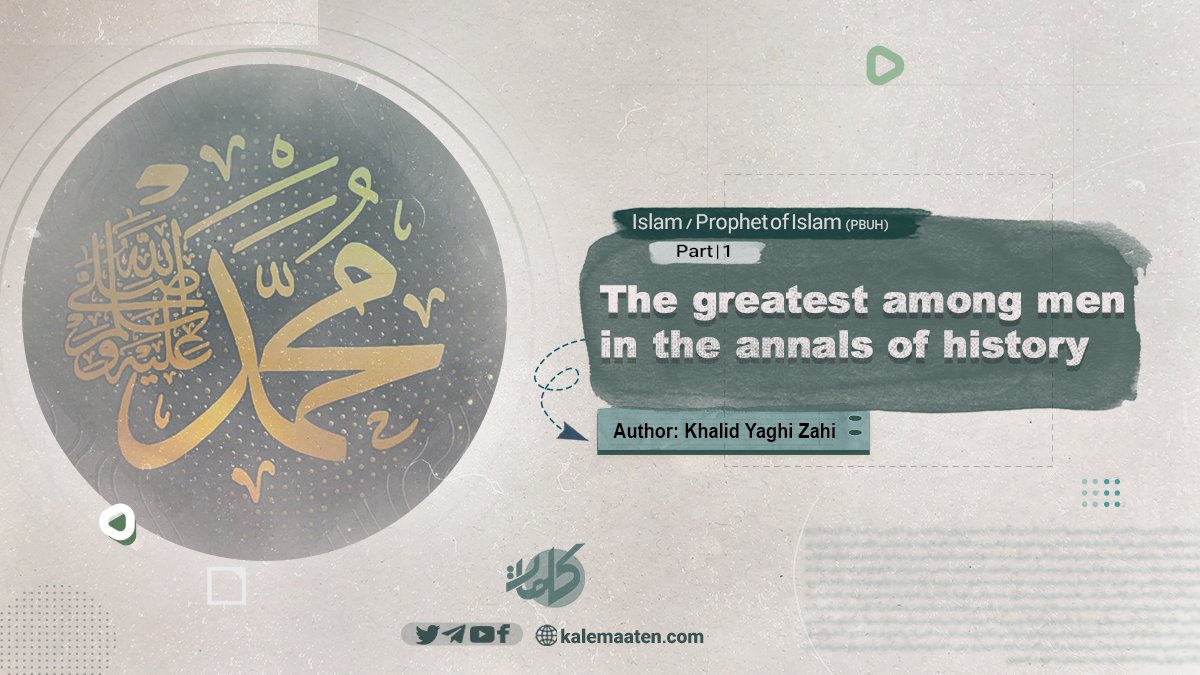
Author: Khalid Yaghi Zahi
The Greatest Among Men in the Annals of History (Part One)
Introduction:
Throughout human history, numerous personalities have emerged, profoundly impacting human societies through their actions and words. Among these figures, Prophet Muhammad (peace be upon him) occupies a unique position not only as a prophet who introduced a new religion but also as a role model for humanity, exemplifying unparalleled ethics and behavior. He was a man who, during the pre-Islamic era of Arabia, guided a society from darkness to light with the message of monotheism and the call to good ethics. Prophet Muhammad (peace be upon him) confronted opposition and hardship with exemplary courage and perseverance, never giving up on his noble goal of guiding humanity.
This article examines part of the life and struggles of Prophet Muhammad (peace be upon him) in Makkah and illustrates how he patiently and steadfastly withstood the threats and harassment of the Quraysh, winning many hearts to the truth through his morals and good conduct.
Images of the Hijrah (Migration):
In Makkah, a war rages between monotheism and polytheism, reformism and rigid thinking, centered on Muhammad (peace be upon him) and the Quraysh. The Quraysh are wielding all their strength, spending their wealth and dedicating their entire world to prevent humanity from accessing this goodness!
Muhammad (peace be upon him) says, “Open the way for me so that I can enter the vastness of the universe, help the weak, support the oppressed, and restore dignity and intellectual independence to mankind.”
They respond: No.
He insists: “Allow my mission the freedom to progress in time; my mission is not confined to a specific time and place.”
They counter: No! But come, if you wish, we will make you our king, shower you with our wealth, and appoint you the leader of this city.
At this moment, history mocks the Quraysh. Muhammad (peace be upon him) is offering them governance over the earth and the leadership of the world, the keys to knowledge and wealth, and the possessions of Khosrow and Caesar; yet they aim to offer him control over a village nestled between two mountains in the windswept desert.
They harassed him, threatening him with dire consequences, throwing thorns in his path, and placing camel entrails upon him while he was in prostration. In Taif, they stoned him, causing him to bleed, mocked him, and unleashed their fools upon him.
Yet none of this ignited anger in him; rather, it provoked a deeper compassion akin to that felt for playful children or the wise for the insane. His only response was: “O Allah, guide my people, for they do not know.”
Nothing could dissuade him from his goal; could the moon in the golden dome be turned back by throwing a flower or a stone?! The early Muslims faced torment to tempt them away from their faith; they were tortured, made to lie naked on scorching sand that roasted their flesh, a heavy stone placed upon their chests as they were offered water in exchange for renouncing the Lord of Muhammad—but they would only declare: “Allah is One, Allah is One!” The joy of prayer and their longing for Paradise dulled the agony of their suffering.
They endured every hardship in the way of Allah, from beatings and injuries to burning, hunger, and sleepless nights. They sweetened the bitterness in the path of Allah, embracing the harshest adversities that pleased Him.
The Prophet (peace and blessings of Allah be upon him) called them to an even more daunting sacrifice: separation from their homeland and leaving their families. For the sake of their religion, they were to journey to a foreign land, unfamiliar with its language or its beliefs. They were directed to Abyssinia, where the Christians were closer to them than the polytheists of Quraysh: «وَلَتَجِدَنَّ أَقْرَبَهُم مَوَدَّةً لِلَّذِينَ آمَنُوا الَّذِينَ قَالُوا إِنَّا نَصَارَى» “And you will find the nearest of people to the Muslims in affection to those who believe, those who say, ‘We are Christians’” (Al-Ma’idah: 82).
They left their homes, abandoned their families, and set forth for Abyssinia; yet even there, harassment and persecution from the polytheists pursued them. The Quraysh exerted every effort to thwart them, to disbelieve, and to remain obstinate; but could they extinguish the light of Allah?
Steam rises naturally and cannot be confined within a glass; if you stop it, it will find a way to escape or break the container. Islam is similar. The Muslims migrated once more, this time to an Arabian homeland—a village destined to remain unknown and insignificant for many years, until blessed with the arrival of Muhammad (peace and blessings be upon him). This village would transform into the mother of cities, the capital of capitals, and a source of streams of goodness and guidance that would flow throughout the earth, irrigating it and filling it with benevolence, as the rivers of wealth and dominion flowed towards it from every direction.
All the Muslims migrated. In Makkah, only three remained: the Prophet (peace be upon him) and two other men; one was his traveling companion, and the other his representative in Makkah—Abu Bakr, the leader of the elders, and Ali, the leader of the youth.
Muhammad (peace be upon him) delayed his own migration; just as a noble captain stands at the stern of a sinking ship, disembarking only after ensuring all passengers have safely left, or as a conscientious shepherd remains in the desert until all his flock has arrived. He remained to support his followers, embracing the danger himself, as peril loomed in its most foreboding form.
Continues…


